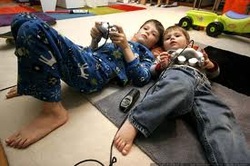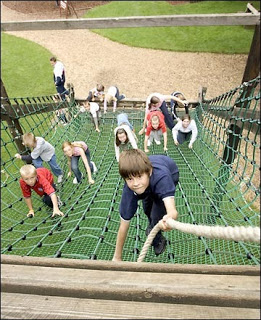 Some of us are old enough to remember when the following things were true about the world we lived in during our childhood: a.There were only 5 to 6 channels on television (no cable/satellite). b. If you had free time, you went outside to play. No one wanted to stay inside (no chat rooms, Neopets, Webkins). c. When you called someone and there was no answer, you called them back later (no voice mail/cell phones). d. The only people that had knowledge of your whereabouts were your parents and the people that were with you no Foursquare, Banjo). e. If you needed to know/learn something, you looked it up in a dictionary or the World Book Encyclopedia set that your parents purchased from the door to door salesperson (no Wikipedia, Google, Bing). The world is much different now. We are in the Digital Age. Computers have been taken to a level I'm sure many of us never would have imagined and is an integral part of our daily lives (regardless of one's age group. As a result, many young people (and adults alike) have ventured into the realm of "Digital Media Overload". The instant gratification one experiences from a Facebook post, Tweet, e-mail, text message, Instagram photo and so on has reached epidemic proportions. Everyone is literally obsessed with being connected. I will have to spend some time thinking about what adults can do to avoid this addiction. However, here are five ways parents/guardians can help their children avoid being sucked into the black hole that is Digital Media Overload: 1. Start good habits early.
2. Use media together.
3. Keep distractions to a minimum.
4. Be a role model.
5. Seek balance.
0 Comments
Children can benefit from activities that promote physical health and still enjoy the ever present technological desires. Here are some tips on how to achieve that perfect balance:
Plan off-line time The lure of “screen time” is very strong and there are various options other than the television Help your child plan her or his day to fit in all of the "musts" (school work, household chores) with the "wants" such as video games and various social media websites Play active games They are not a substitute for personal experience but active games are a great solution to the sedentary lifestyle the majority of today’s youth lead Indoor small group/group activities are a good choice for when you simply can't get outdoors due to inclement weather Consider the example you're setting Whether you like it or not, you are your child’s role model Turn off your phone during dinner time or while speaking with your child Your actions will send a message that screen limits don't only apply to you Use media/technology as a spring board If it's a game that encourages entrepreneurship or a how-to video on YouTube or www.ehow.com, think of ways to enhance your kids' favorite electronic pursuits into the real world. It's OK to be bored Experts recommend that kids let their minds wander If they are bored, it is the perfect time to figure out how to entertain themselves (not have someone or something entertain them As the saying goes, "Necessity is the mother of invention." In other words, difficult situations inspire ingenious solutions. Impose some downtime on your kid (and yourself!)  Recently the Los Angeles Unified School District (LAUSD)removed "flavored" milk form the menu at its schools. They are attempting to combat the epidemic of childhood obesity by eliminating extra sugar intake as well as offering healthier breakfast and lunch choices for students (corn dogs, chicken nuggets and other breaded items will soon be gone as well). Several experts claim that the flavored milk adds unnecessary sugar to kids' diets. I found it strange that they did not "86" various juices from the menu as well. There is a lot of sugar in those drinks (be it artificial or natural). Oh yeah, how about the vending machines on campuses that contain sodas, juices and snacks that would be considered unhealthy? I don't think the obesity problem has so much to do with flavored milk, soda, or corn dogs. The problem exists because of a current generation of youth that lead sedentary lifestyles. Watching television, playing video games, long hours spent on the computer or any other handheld device that has a screen. All of the aforementioned "activities" are done while sitting on your ass and not moving (the extent of movement involves the index finger or the thumbs). "Screen Time" has become the desired activity for many of today's youth thus robbing them of any type of locomotor activity. It is painfully obvious because of the number of kids I've seen that are uncoordinated (unable to skate on FOUR WHEELS let alone two,unable to ride a bike, or even balance on one leg for more than 3 seconds)and have NO endurance (even at the lowest level). Parents need to "man up" and establish some rules to have your kids become more active. Screen time doesn't have to be eliminated but can be significantly reduced. The same can be done for food choices.Have some open dialogue. It only takes a little time and effort. Please stop blaming McDonald's, Burger King and any other fast food establishment for what they serve. Here's an idea...if you don't want your child/children to eat the fast food, DON'T BUY IT FOR THEM. I know they could eat it when you are not around, but how often is that? Lay down the law, and enforce it.  An adult's words as well actions speak volumes. Children pay attention to everything they see in their immediate surroundings. Whatever behavior they see is what they will emulate. So, if your child sees you reading, books, magazines, newspapers, and newsletters she or he will realize that reading is important and will want to read as well. Reading to your child on a regular basis is one of the best ways to encourage your emerging reader. Here are some tips on making the most of your reading time with your child/children: 1. Make reading time a relaxing and enjoyable activity. 2. Eliminate all distractions such as televisions, telephones, and stereos. 3. Establish a routine time and place for reading when possible. 4. Have your child select the books they would like to read. Don’t select books for them. 5. Before beginning a new book, tap into your child’s prior knowledge. For example, read the book’s title and ask your child what the story might be about, what type characters are in the book and where the story may take place. 6. Allow your child to hold the book, see the illustrations and turn the pages. 7. Periodically stop to ask questions about the reading to help your child develop comprehension skills. 8. Read the books with expression. Alter your voice for characters and become animated during exciting parts. 9. Read the same books repeatedly. Children really like repetition and enjoy being able to “read” along when they become familiar with a book. |
AuthorRandy Sally Archives
June 2023
Categories
All
|



 RSS Feed
RSS Feed
